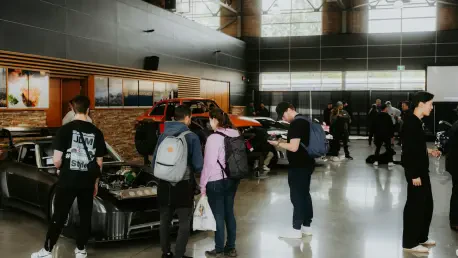In the intricate world of event planning, transportation logistics often become a hidden element that can jeopardize success or elevate the event experience to new heights. As 2025 witnesses a resurgence in face-to-face corporate events across the United States, the focus on passenger ground transportation emerges as a determinant of an event’s smooth execution. This crucial component marks the first and last point of contact for attendees, setting the tone for their entire event journey. However, overlooking transportation logistics can induce detrimental effects such as delays and confusion. Common challenges like traffic congestion, flight delays, and misunderstandings at pick-up zones can disrupt not only the schedule but also the overall effectiveness of the event. Now, with the return to in-person meetings, these potential pitfalls have grown in complexity and impact, driven by the increasing scale of events and a renewed emphasis on personal interactions.
Financial considerations weave seamlessly into this complex equation, particularly as corporate travel budgets expand. Observers note that 70% of corporate events in North America are projected to take place in person this year, reflecting a broader trend of revived business interactions. This evolution underscores the imperative for event planners to reconsider reliance on outdated methods and embrace innovative solutions. Many still depend on manual spreadsheets or outsource logistics to agencies that may not possess the necessary resources. These conventional approaches often falter under pressure, unable to handle the intricate specifics of transporting large groups effortlessly. The shift towards integrating technology-driven solutions in transportation logistics thus becomes an essential focus for planners looking to streamline operations and deliver exceptional event experiences.
Embracing Technological Solutions in Transportation
The shift towards innovative, technology-driven solutions in passenger ground transportation is no longer a mere option but a crucial strategy for corporate event planners aiming to meet current demands. Advanced technology incorporating AI-powered platforms is reshaping transportation logistics by providing robust solutions to perennial challenges. These platforms not only offer a comprehensive network of vetted chauffeurs but also incorporate features such as ride management centralization, automated vehicle assignments, and real-time ride tracking, fundamentally transforming how ground transportation is coordinated. With these advancements, planners gain the ability to maintain quality, safety, and efficiency at scale regardless of the diverse arrival points of their attendees. Financial operations see notable enhancements as well, with streamlined billing processes enabled through automation. Invoices are efficiently allocated to applicable departments and integrated into expense management systems, reducing administrative burdens and promoting financial clarity.
The successful implementation of these advanced technologies at prominent events exemplifies their transformative potential. At Cvent Connect 2024, the deployment of a cutting-edge travel management tool resulted in seamless transportation coordination, achieving a perfect on-time performance rate with no guest complaints. This instance highlights not only the operational efficiency gained through technology adoption but also the positive impact on attendee satisfaction. Such technology-centered strategies reinforce the necessity of shifting away from outdated methods, transforming transportation logistics from merely another task in event planning to a strategic advantage. Event planners are increasingly recognizing that incorporating these solutions ensures both immediate event success and sets a benchmark for future endeavors in an industry progressively relying on technological integration to enhance efficiency.
Addressing Challenges and Enhancing Efficiency
Identifying and addressing the weak links in current transportation logistics systems is imperative for event planners aiming to optimize efficiency and enhance attendee experiences. Inefficiencies in coordination, communication lapses, and delays are common pain points that require careful evaluation and proactive management. These factors directly impact participants’ perceptions and experiences, making it crucial to examine whether existing systems can accommodate the dynamic demands of modern events, including last-minute changes or large-scale logistical requirements. Planners must rigorously analyze current practices and identify areas where time and resources are being squandered. Technological solutions provide a clear path to improvement, offering the tools needed to overcome these challenges while maintaining quality service delivery.
The adoption of modern, tech-driven transportation solutions provides planners with the means to transcend logistical obstacles and, in turn, elevate the overall event experience. By strategically managing these systems, transportation evolves from being an overlooked component to a central facilitator of event success. The flexibility, efficiency, and reliability afforded by advanced technology are essential in meeting the increasing expectations of today’s event attendees. Successfully integrating technology into transportation logistics not only addresses current logistical challenges but also establishes a framework for future advancements. By doing so, planners can drive satisfaction and engagement, ultimately ensuring that events are not only executed smoothly but also leave a lasting positive impression on all participants.
Transforming Transportation Logistics into Strategic Assets
In the complex arena of event planning, transportation logistics play a pivotal role, potentially making or breaking an event. As 2025 sees a revival of in-person corporate events across the U.S., the emphasis on passenger ground transportation becomes crucial to seamless execution. This element serves as both the first and last point of contact for attendees, influencing their overall experience. Ignoring transportation logistics can lead to damaging outcomes like delays and confusion. Challenges such as traffic jams, flight delays, and pick-up misunderstandings can disrupt schedules and diminish the event’s effectiveness. With in-person events growing in scale and the focus on personal interactions intensifying, these issues have become more significant. Financial considerations are also key, as corporate travel budgets increase. An estimated 70% of corporate events in North America will be held in person this year, highlighting the need for event planners to abandon outdated methods. Many still rely on manual spreadsheets or outsource logistics to under-resourced agencies, which often falter. Embracing tech-driven solutions for transportation logistics is crucial for streamlining operations and delivering remarkable event experiences.









